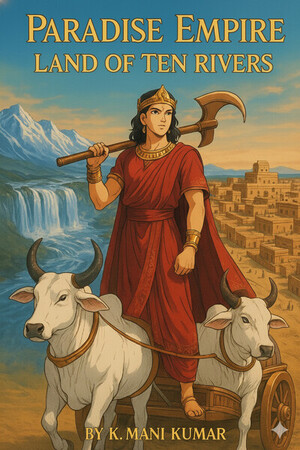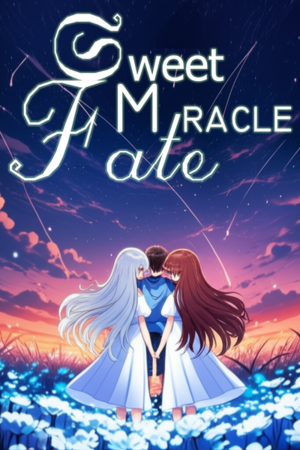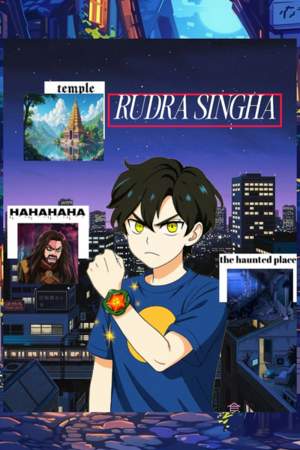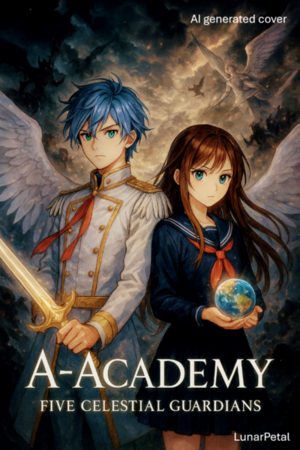Chapter 7:
Chapter 3: Journey Toward Destiny — Part 3:Daydream or the First Battle?
The Paradise Empire: The Land of Ten Rivers season 1 part 1
Chapter 3: Journey Toward Destiny —Part 3:Daydream or the First Battle?
Scene 1: Tim’mayya’s Reflection
(Scene opens: Night. At the camp. Tim’mayya sits near the faint embers of a fire, the shadows of the chariot and bulls flickering in the lamplight.)
Tim’mayya kept watch over the sleeping Vīra and the majestic zebus. The flickering oil lamp threw long, dancing shadows inside the simple tent. He looked across at his cousin, deep in sleep after a long day of travel.
Tim’mayya (whispering, eyes distant): “There was one more incident I still remember. How could I ever forget? I would have died that day… And even now, I wonder—was it only my daydream… or was it real?”
He rubbed his eyes. The memory began to unspool, vivid and consuming.
(Scene shifts: Flashback — Tim’mayya’s narration begins.)
Tim’mayya’s Voice (narrating): “This happened when Vīra and I were fifteen or sixteen years old. The bulls and Vīra were now strong, powerful, almost bursting with energy. He began helping his father with the farming, while I went with my father to Maniyanūru to learn the ways of trade.”
Spring — The Farmer’s Shadow
(Scene shifts: Manūrū. Vīra at age 16. Morning mist drapes over the village lake like a silver veil.)
The lake shimmered beneath the rising sun, glowing like molten bronze. Steam rose from the oxen’s flanks as they pulled the heavy wooden plough through the damp earth. Behind them, Vīra walked bare-chested, palms already calloused, his body lean, strong, and growing into a young man’s frame.
Father’s voice cut through the misty morning:
Father: “Hold the handle steady, boy. The earth listens when your hands do.”Vīra tightened his grip. The soil parted — dark, wet, fragrant. A quiet smile flickered across his face as earthworms twisted in the furrow. Life seemed to awaken beneath his feet.
Vīra (whispering, almost to himself): “So this is how the gods write their first lines of spring…”
His father chuckled, pride gleaming in his eyes.
Early Summer — The Seeds of Fire
The sun climbed high, and the high-pitched song of cicadas filled the coconut palms. Vīra and his father sat in the shade, sifting seeds through their fingers. Cow dung and neem leaves, drying nearby, filled the air with a bitter, sacred scent.
Vīra mixed the grain in a clay bowl, chanting softly as his father had taught him:Vīra (chanting): “From fire, water; from water, life. Let no worm or curse touch this seed.”
His father tied a small red thread—the raksha—on Vīra’s wrist and handed him the first handful of seed. Together, they stepped into the field. Each throw sent the grain scattering across the earth, and the land seemed to sigh, as if receiving a divine promise.
Monsoon — The Dance of Mud and Thunder
Rain pelted the fields like silver needles. Vīra waded through knee-deep water, his hair plastered to his brow. Lightning forked across the sky. He and his father guided the bulls through puddled fields, the wooden plough slicing through the wet, liquid earth.
Father (yelling over the thunder): “Now you know, son—the world is born from chaos!”
Vīra laughed, soaked and shining, mud covering his arms like war paint. Two cranes circled overhead—a sign of a good harvest.
Autumn — The Golden Breath
The fields blazed with ripened grain. Straw and smoke scented the air. Father and son cut sheaves with bronze sickles; the stalks fell in rhythm — shrrt… shrrt… shrrt. Children chased birds away with rattles; women sang near the granary.
At dusk, Vīra stacked the bundles, his back straight, his body fully growing into a man’s shape.
Father: “You’ve earned a farmer’s shadow now, my son.”
Vīra (smiling): “Then tomorrow, I’ll earn the sun.”The Insult to Dharma
(Scene shifts: Winter — The Feast of Thanks. Night.)
A massive bonfire blazed at the field’s edge. Drums echoed. Fresh rice boiled in clay pots; milk overflowed. Vīra and his father bowed before the temple of Manūrāyya and Manūramma, offering the first handful of grain.
Vīra: “To you, great gods. For letting us stand and breathe.”
Tim’mayya’s Voice (narrating): That night, Vīra and I danced together, celebrating the year’s success, happiness, and the gods’ blessings. But then he saw something that made him freeze.
The villagers brought a buffalo before the temple, preparing it for sacrifice. Vīra moved forward, furious, but I grabbed his arm.
Vīra (eyes burning with outrage): “That is not right, Tim’mayya! Manūrāyya and Manūramma are like mother and father—not only to humans but to animals too! This custom of animal sacrifice is nowhere in the sacred texts! We are their children! Believing prosperity comes from this… it is an insult to the gods themselves!”
Tim’mayya: “You are right, Vīra, but we cannot change the old ways. They are too deeply rooted.”
Vīra: “One day I will! One day I will change it! I swear—to save the honor of the gods, I will!”
Tim’mayya’s Voice (narrating): That night, we returned home. Days later, a new threat emerged. Villagers entering the forest became prey to a horde of foxes that had suddenly appeared.
The Mockery of the Fox
(Scene shifts: Vīra at age 16. Deep in the forest.)
Tim’mayya’s Voice (narrating): You know Vīra. Foolish, fearless… he went deep into the forest for wood, taking the bulls with him.
From behind the bushes, a deadly fox leapt—the Leader Fox of the horde.
Vīra looked at it, completely unfazed.
Vīra: “Nakka Bāva (Brother Fox)?”Leader Fox (inner thought): Yeah, Nakka Bāva to your hell! Today, you will be my lunch… and your bulls, my feast!
The fox lunged for his throat. Vīra was faster. Mid-air, he grabbed the fox by the neck.
Leader Fox (choking): “O—my neck!”
Vīra slammed it on the ground and tossed it toward the bulls. The two zebus—Vīra’s brothers—played a terrifying game, tossing the fox with their horns and heads. The fox, battered and bleeding, fled in panic.
Tim’mayya’s Voice (narrating): When Vīra returned with the wood, our family rejoiced at his safety. He told me the tale—but I did not believe it. I trusted him, yes, but thought he exaggerated. That ignorance nearly killed me.
The Divine Battle(Scene shifts: Early Summer. Mango Garden near Manūrū.)Tim’mayya’s Voice (narrating): That day was the day of the battle. Vīra and I went to the mango garden to collect mangos. We were two brainless youths, and we went alone with the bulls. We didn’t even have the chariot; it was created later we went only with normal cart , after Vīra found his true strength.
As we started collecting the mangos, we saw a horde of foxes arrive.
And that same Leader Fox came forward. Suddenly, that fox started speaking, somehow, in a human voice.Leader Fox: “You foolish human! You did a big mistake by insulting me like that, and you will pay for that!”I saw it then—what I never expected. Vīra’s Horse symbol and Elephant symbol on his shoulders started shining in crimson red and deep black again.
Vīra immediately ran at our cart, grabbed the Wooden Plough (Langala), and pulled it out.
He placed the ancient tool on his shoulder.Multiple foxes lunged forward.
Vīra’s symbols were shining more brightly than ever. He started swinging the Wooden Plough with uncontrollable speed.
I never saw anything like this before! He moved that heavy plough as if it was a toy, using it as a weapon against the foxes. That speed was more divine than human in nature.
The Leader Fox roared an order.
Leader Fox: “Enough playing! It’s time we show our true power!”
Every fox, including the leader, started transforming into terrifying, ancient Demons.I jumped down and hid behind the zebu bulls, trembling. The demons rushed at Vīra with supernatural speed.
Vīra swung right—six demons fell! He swung left, and then hit the one in front. He started swinging the Wooden Plough all around, and the demons were falling all over the garden as old leaves fall from mango trees.
Vīra looked at the Demon Leader, completely covered in demon blood.
Vīra: “Come on, Nakka Bāva!”Demon
Leader (snarling): “Nakka Bāva is your beep***!**”
The Demon Leader rushed towards Vīra, only to see the two divine symbols—the Horse and Elephant—and he stopped, stunned in mid-air.
Demon Leader's Horror
Demon Leader (horrified): “The symbol of God of Glory Virrayya and the symbol of Great Protector God Nalannaya?!”
Vīra ran at his bulls, and with their help, he jumped high, reaching the Demon Leader’s height. With his Wooden Plough raised, Vīra was almost about to strike the Demon Leader's neck—
(Scene shifts abruptly to a blank, white light.)
Tim’mayya’s Voice (terrified): And then... all I know is blank. The scream of the Demon Leader... and then when I opened my eyes... nothing!
The Daydream Question(Scene shifts: Mango Garden, moments later.)
I looked at Vīra, panicked: “Where are the demons? What happened? How did you…?”
Vīra (confused): “Demons? Tim’ma, you eat too many mangos and daydream too much. I’ve collected the basket. Let’s go.”
Tim’mayya’s Voice (narrating): Later, I learned the legend was true. Ancient demons, disguised as foxes, haunted humans in the forest. Manūrāyya and Manūramma had protected the village—but human sacrifices had dishonored them. Vīra was right. But the sight I saw… was it daydream or reality?
Setting the Guard (Conclusion)
(Scene shifts: Present. Roadside camp, night.)
Tim’mayya glanced once more at the sleeping Vīra and the mighty bulls.
Tim’mayya: “Only he knows the truth. Perhaps he will tell it someday. But those reading my account might wonder—how Vīra became famous, in our village and all others, and how he ended that undivine custom. That… is a completely different story.”
(Camera pans upward — the silent village night. Stars shimmer above. The Pedda Nāḍi River flows silver under the moonlight. A faint wind carries distant temple bells.)
Chapter 3 Part 3 Ends




Please sign in to leave a comment.